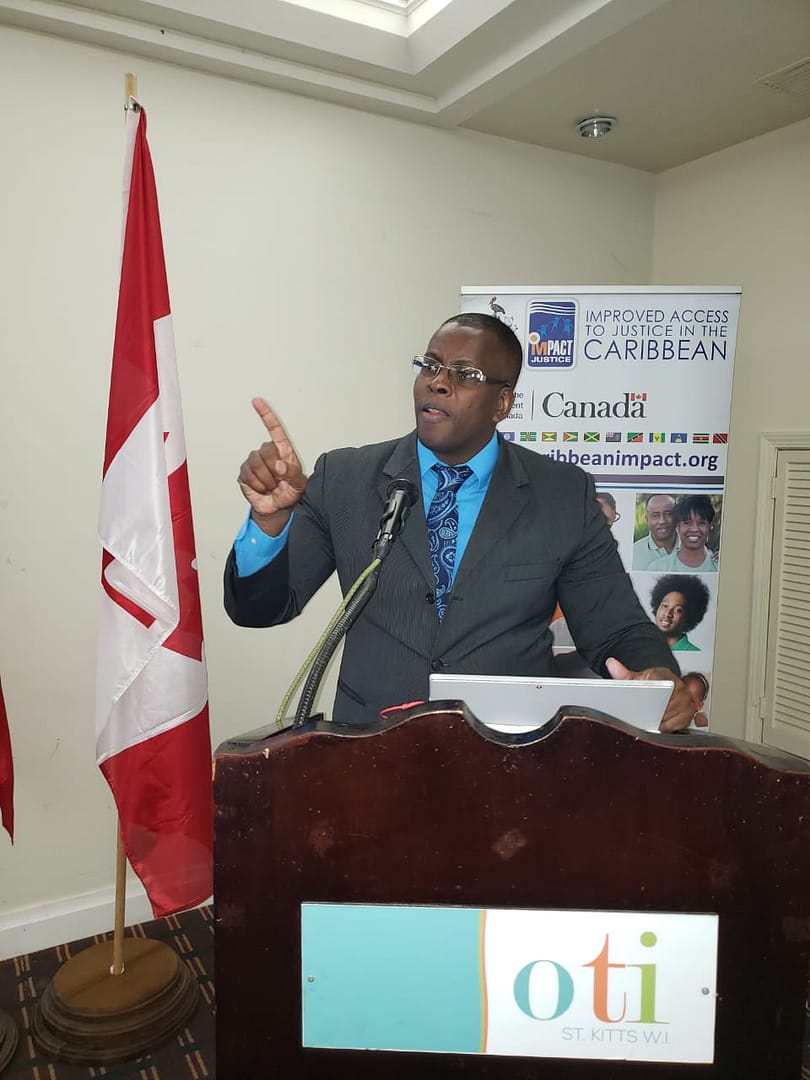

As work continues towards establishing a national sex offenders’ registry (SOR) in Antigua and Barbuda, the head of the committee spearheading the initiative is recommending a non-public database because of fears of vigilantism.

According to Director of Law Reform, Adlai smith, no matter the jurisdiction, public SORs have resulted in “witch hunting”, with some registrants being killed. That is why he prefers a system of limited disclosure to the public. This means that rather than have carte blanche access to such information via a website as obtains in some American states, residents here would have to apply to the registry to find out the status of a person.
Smith also opposes a public register because he believes it may compromise the right to a fair trial. “The jurors could have access to it, look and see and assume that a person is guilty because of previous conviction,” he opined.
The attorney-at-law shared his views recently, in St. Kitts, during a workshop on “The Constitution and draft legislation Initiatives in the OECS”, hosted by IMPACT Justice – an eight-year regional justice sector reform project funded by the government of Canada.

Smith was at the time making a presentation on IMPACT Justice’s draft regulations for a Sexual Offences Registry: all part of proposed amendments to Antigua and Barbuda’s Sexual offences Act.
The government has embraced the draft regulations but is “improving” them by drawing on similar laws from around the world, including South Africa’s. Following that country’s lead, Smith is suggesting that it be mandatory for businesses engaging in child-related work here, to consult the SOR to determine if the potential employee is a convicted sex offender. Failure to do so would result in significant penalties for the entity.
“The whole idea is to reduce face-to-face contact between children and those offenders,” he said, stressing that while an SOR is no silver bullet, there is no harm in trying it as part of the strategy with dealing with sexual offenders.
WHO MUST REGISTER
Adult citizens and permanent residents, who, on or after the commencement of the amendment to the Sexual Offences Act, are convicted of a registrable offence after the passing of the amendment or are serving a custodial sentence for a registrable offence. It does not matter if they are convicted inside or outside of Antigua and Barbuda.
Regardless of which type of SOR Antigua and Barbuda sets up, they will each record the name, former names, date of birth, date of conviction for each registrable offence and photograph of the registrant. The Non-public register which would be accessed by law enforcement only, will have additional information such as, among other things, a DNA profile, fingerprint and IP addresses.
LIMITED RESOURCES
At present, the draft regulations call for the registering of anyone convicted of sexual offences including rape, indecent assault, serious indecency, child pornography, sexual intercourse with minors and mentally disable persons.
But, Smith advised that with sexual offences taking up much of the criminal assizes list each term and given the government’s limited resources, the register should be restricted to high-risk offenders as well as those who prey on children and the mentally disabled.
Should all sex offenders still be required to register, he is recommending that DNA profiles be compiled for only the above categories of perpetrators because the process is not cheap. “That may be a better and more frugal use of the resources,” the attorney reasoned.
Under the draft regulations, registered sex offenders would be required to report to the Police at different intervals. Reporting periods would be commensurate with the length of the custodial sentence. Also, one would remain on the register until and unless one makes an application for the High Court to expunge one’s information on completing the reporting period or on the basis of compelling reasons. The regulations are silent on what constitutes compelling reasons.
[The Director of Law Reform told OECS lawyers and members of Parliament present he had insisted that upon receiving an application to expunge info, the High Court must inform complainants in the offences for which the applicant was convicted.
“The complaints must be able to tell the court how they feel” about the information being removed from the register.
It is proposed that as part of the application, the registered sex offender must undergo a mental assessment by a psychiatrist. The regulations do not indicate who will bear the cost, prompting Smith to advise that this be articulated because it is an expensive undertaking. He also argued that if a superior court quashes a sex conviction, the High Court should not require a psychiatric report.
MANAGEMENT OF THE REGISTER
Smith accepts IMPACT Justice’s recommendation for the Commissioner of Police to oversee the register, in conjunction with designated officers who would all take an oath of confidentiality. He however differed with the suggestion of signing up at the nearest police station, saying it should be done at a central location to minimize breaches of confidentiality.
“The fewer people have access to info, the better. You don’t run the risk of info coming out when it ought not to,” the public official advised.
IMPACT Justice’s draft regulations also state that after a person ceases to be a registered sex offender their fingerprints, photographs, DNA and other personal information must be destroyed. But according to Smith, “They should be kept. But, if the conviction has been overturned, they should be deleted.”
The proposed regulations spell out several offences that convicted sex offenders could commit including failure to register, failure to report after registering and failure to notify intent to travel. Such breaches could result in a fine or imprisonment, or both.
The administrators of the database would not be exempt from punishment if they share intentionally and without lawful excuse and justification, the information contained on the website.
Smith ended his presentation with a warning.
“If you set up an SOR today, you are not going to have a situation where persons are no longer committing offences. You will not have a drop in recidivism rates instantly and so on. [And there is a lot of reading to suggest in territories like the USA, that SORs that are public have little effect on recidivism rates]. You look at the SOR in conjunction with things like a parole system, imprisonment and [free] rehabilitation programmes.”
AGREEMENT MIXED WITH CAUTION
Rigorous debate followed Smith’s presentation. Several participants agreed that SORs are not panaceas. They also advocated for non-public databases given the “smallness” of Eastern Caribbean countries. IMPACT Justice is hoping that all members of the Organisation of Eastern Caribbean States (OECS) will eventually set up SORs, given the free movement within the sub-grouping.
A sentiment shared by Antigua and Barbuda Magistrate Conliffe Clarke who warned that without harmonization convicted sex offenders could evade monitoring by fleeing to OECS territories that do not have a register.
He revealed that in his short time as a magistrate he has discovered a high rate of recidivism among sexual offenders. Clarke however agreed with Monserrat’s Director of Public Prosecutions, Oris Sullivan, that confessing to a sex crime should not result in automatic placement on the register because according to both of them, “not all confessions are confessions.”
It is for this same reason that Grenadian Attorney, Ruggles Ferguson counselled caution. He then pointed out that sexual offences are easy to allege and difficult to defend, with it being a matter of who the jury believes on any given day. His solution is for a “determination” to be made on a case by case basis, rather than mandatory registering.
“That sounds like double jeopardy where someone serves a sentence and then has to face another kind of penalty, probably of a worse kind, even though they might not be the type of person that society needs to be protected from because of the particular circumstance.” However, Smith had earlier alluded to legal authorities from the European Court of Human Rights that the requirements of registration for sex offenders did not amount to a penalty.
Renowned Antigua and Barbuda Attorney-at-Law, Dr. David Dorsett told the workshop that he is concerned about how the SOR would work in “small” jurisdictions and cautioned against rushing to set up a registry.
Following the intense discussion, IMPACT Justice’s regional Director, Professor Velma Newton stated that the agency would set up a committee comprising representatives from OECS members, to include Adlai Smith and UK Criminologist, Josephine Doyle, to further consider the draft SOR regulations.
Advertise with the mоѕt vіѕіtеd nеwѕ ѕіtе іn Antigua!
We offer fully customizable and flexible digital marketing packages.
Contact us at [email protected]














No!!! The database need be be made public.
A woman living along need to know if a sex offender is living next to her.
ABSOLUTELY, the sex offender data base must be public, 100% transparent.
The public has a right to know who these Nuisance are. So the can keep doing it come on Smith I know your smarter than that. The law should protect every one but how this look they are been protected
This is otterly ridiculous. If they are murdered there are consequences for persons actions why keep this shit a secret? This makes absolutely NO sense.
WHO is really behind such a dumb idea, and WHY?
Why is this even in the news? If you’ll know you going to keep it private then keep that bullshit information private too.
I noticed that ANR deleted at least 2 comments that were previously posted under this article. Wonder why?
Comments are closed.